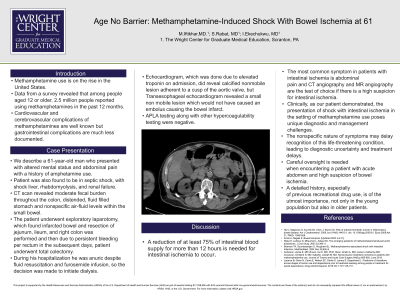Sunday Poster Session
Category: Colon
P0360 - Age No Barrier: Methamphetamine-Induced Shock With Bowel Ischemia at 61
Sunday, October 27, 2024
3:30 PM - 7:00 PM ET
Location: Exhibit Hall E

Has Audio

Mohammad Faisal Iftikhar, MD
Wright Center for Graduate Medical Education
Scranton, PA
Presenting Author(s)
Mohammad Faisal Iftikhar, MD1, Sandra Rabat, MD2, Ifunanya Ekechukwu, MD2
1Wright Center for Graduate Medical Education, Scranton, PA; 2The Wright Center for Graduate Medical Education, Scranton, PA
Introduction: Methamphetamine use is on the rise in the United States, data from a survey revealed that among people aged 12 or older, 2.5 million people reported using methamphetamines in the past 12 months. Cardiovascular and cerebrovascular complications of methamphetamines are well known but gastrointestinal complications are much less documented.
Case Description/Methods: We describe a 61-year-old man who presented with altered mental status and abdominal pain with a history of amphetamine use. Pt was also found to be in septic shock, with shock liver, rhabdomyolysis, and renal failure. CT scan was done which revealed moderate fecal burden throughout the colon, distended, fluid filled stomach and nonspecific air-fluid levels within the small bowel. The patient underwent exploratory laparotomy, which found infarcted bowel and resection of jejunum, ileum, and right colon was performed and then due to persistent bleeding per rectum in the subsequent days, a total colectomy was performed. During his hospitalization he was anuric despite fluid resuscitation and furosemide infusion, so the decision was made to initiate dialysis. Echocardiogram, which was done due to elevated troponin on admission, did reveal calcified nonmobile lesion adherent to a cusp of the aortic valve, but Transesophageal echocardiogram revealed a small non mobile lesion which would not have caused an embolus causing the bowel infarct. APLA testing along with other hypercoagulability testing were negative.
Discussion: A reduction of at least 75% of intestinal blood supply for more than 12 hours is needed for intestinal ischemia to occur. The most common symptom in patients with intestinal ischemia is abdominal pain and CT angiography and MR angiography are the test of choice if there is a high suspicion for intestinal ischemia. Clinically, as our patient demonstrated, the presentation of shock with intestinal ischemia in the setting of methamphetamine use poses unique diagnostic and management challenges. The nonspecific nature of symptoms may delay recognition of this life-threatening condition, leading to diagnostic uncertainty and treatment delays. Careful oversight is needed when encountering a patient with acute abdomen and high suspicion of bowel ischemia. A detailed history, especially of previous recreational drug use, is of the utmost importance, not only in the young population but also in older patients.
Disclosures:
Mohammad Faisal Iftikhar, MD1, Sandra Rabat, MD2, Ifunanya Ekechukwu, MD2. P0360 - Age No Barrier: Methamphetamine-Induced Shock With Bowel Ischemia at 61, ACG 2024 Annual Scientific Meeting Abstracts. Philadelphia, PA: American College of Gastroenterology.
1Wright Center for Graduate Medical Education, Scranton, PA; 2The Wright Center for Graduate Medical Education, Scranton, PA
Introduction: Methamphetamine use is on the rise in the United States, data from a survey revealed that among people aged 12 or older, 2.5 million people reported using methamphetamines in the past 12 months. Cardiovascular and cerebrovascular complications of methamphetamines are well known but gastrointestinal complications are much less documented.
Case Description/Methods: We describe a 61-year-old man who presented with altered mental status and abdominal pain with a history of amphetamine use. Pt was also found to be in septic shock, with shock liver, rhabdomyolysis, and renal failure. CT scan was done which revealed moderate fecal burden throughout the colon, distended, fluid filled stomach and nonspecific air-fluid levels within the small bowel. The patient underwent exploratory laparotomy, which found infarcted bowel and resection of jejunum, ileum, and right colon was performed and then due to persistent bleeding per rectum in the subsequent days, a total colectomy was performed. During his hospitalization he was anuric despite fluid resuscitation and furosemide infusion, so the decision was made to initiate dialysis. Echocardiogram, which was done due to elevated troponin on admission, did reveal calcified nonmobile lesion adherent to a cusp of the aortic valve, but Transesophageal echocardiogram revealed a small non mobile lesion which would not have caused an embolus causing the bowel infarct. APLA testing along with other hypercoagulability testing were negative.
Discussion: A reduction of at least 75% of intestinal blood supply for more than 12 hours is needed for intestinal ischemia to occur. The most common symptom in patients with intestinal ischemia is abdominal pain and CT angiography and MR angiography are the test of choice if there is a high suspicion for intestinal ischemia. Clinically, as our patient demonstrated, the presentation of shock with intestinal ischemia in the setting of methamphetamine use poses unique diagnostic and management challenges. The nonspecific nature of symptoms may delay recognition of this life-threatening condition, leading to diagnostic uncertainty and treatment delays. Careful oversight is needed when encountering a patient with acute abdomen and high suspicion of bowel ischemia. A detailed history, especially of previous recreational drug use, is of the utmost importance, not only in the young population but also in older patients.
Disclosures:
Mohammad Faisal Iftikhar indicated no relevant financial relationships.
Sandra Rabat indicated no relevant financial relationships.
Ifunanya Ekechukwu indicated no relevant financial relationships.
Mohammad Faisal Iftikhar, MD1, Sandra Rabat, MD2, Ifunanya Ekechukwu, MD2. P0360 - Age No Barrier: Methamphetamine-Induced Shock With Bowel Ischemia at 61, ACG 2024 Annual Scientific Meeting Abstracts. Philadelphia, PA: American College of Gastroenterology.
